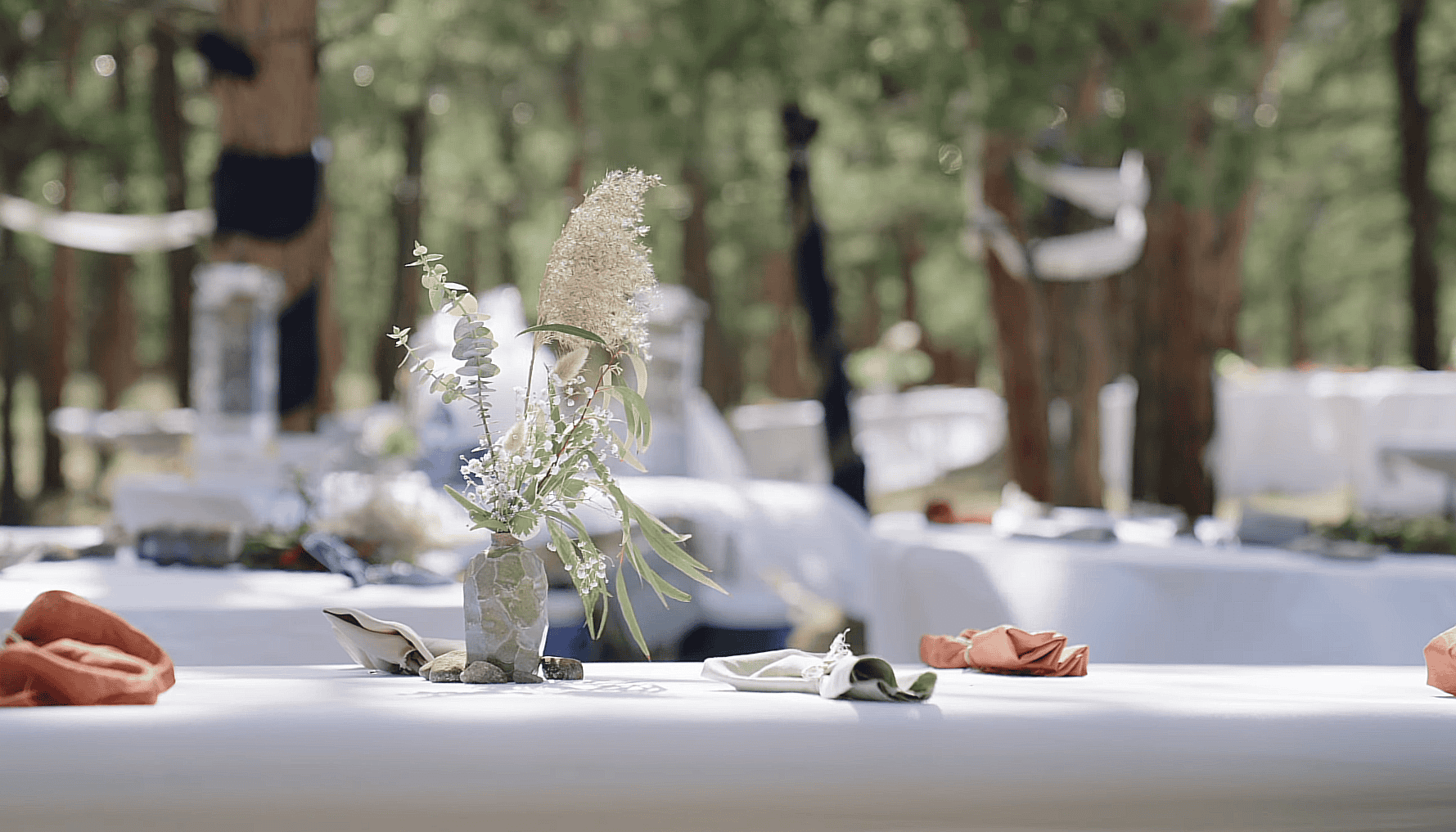Many modern couples are embracing sustainability in their wedding plans, reflecting a broader cultural shift toward eco-conscious living.
The “eco-wedding” movement is all about celebrating love in a way that also shows love for the planet. Imagine a wedding where the bridal gown is vintage and the decor is upcycled or compostable.
Guests might find their invitations in their email inbox instead of a mailbox, and at the end of the night, leftover food is donated rather than dumped.
This is not a niche fad—it’s a rising trend as more couples infuse their values of sustainability into the big day, proving that going green and getting married can go hand in hand.
What Is an Eco-Wedding, and Why Is It Growing?
An eco-wedding (or eco-friendly wedding) is a wedding planned with sustainability in mind, aiming to minimize waste and reduce environmental impact. This can mean anything from choosing a local outdoor venue (to cut down on travel emissions) to wearing a secondhand wedding dress.
The trend is growing quickly because environmental consciousness is on the rise. Many couples—especially millennials and Gen Z—feel that their wedding should reflect their personal values, including caring for the planet.
Instead of the traditional all-out extravaganza, today’s lovebirds are often opting for celebrations that are intimate, personalized, and purposeful.
In short, the eco-wedding movement is fueled by a desire to start married life on a meaningful, responsible note.
Another reason sustainable weddings are booming is awareness of the environmental cost of big events. People are learning that a standard wedding can generate an astonishing amount of waste and carbon emissions.
According to Green Union, the average wedding produces about 400 pounds of garbage and 63 tons of CO2. Multiply that by the 2.5 million or so weddings that happen annually, and it’s clear why couples are increasingly uneasy about the environmental footprint of saying “I do.”
Facing these facts, more people are inspired to plan weddings that give back or at least do less harm, rather than contribute to the problem.
Green Weddings by the Numbers
Sustainable weddings aren’t just a passing trend—they’re becoming the new norm. A recent UK survey revealed that a remarkable 98% of couples are now considering sustainability in their wedding planning. It’s clear that more people want their big day to align with their values.
This growing interest is backed by numbers. The Knot’s Real Weddings Study found that 25% of weddings last year included sustainable decor or eco-friendly elements—up from the year before and expected to rise even more.
Fashion is evolving too. Major bridal retailers like David’s Bridal have noted that 58% of their brides are looking for sustainable fashion choices. In response, many now offer eco-conscious collections featuring recycled or low-impact fabrics.
And it’s not just couples making the shift—vendors are, too. Platforms like Green Wedding Shoes are seeing increased demand for low-waste, carbon-conscious options across all aspects of the event.
Sustainable Choices Couples Are Making
Couples are getting increasingly creative when it comes to planning weddings that are both stylish and sustainable. One of the most popular choices is going with preloved or rented attire. Brides are finding their dream dresses on platforms like Stillwhite, while grooms are turning to suit rental services instead of purchasing new ones they’ll rarely wear again.
Eco invitations are also becoming the go-to. Instead of traditional paper invites, many couples are sending digital versions through services like Greenvelope, or opting for seed-paper cards that guests can plant at home—pretty and planet-friendly.
When it comes to food, local and plant-based catering is leading the charge. Seasonal, farm-to-table menus packed with vegetarian or vegan options help reduce food miles and carbon emissions, while supporting local growers and businesses.
Sustainable decor is another major focus. Couples are embracing dried flower arrangements, secondhand furniture and tableware, and potted plants that guests can take home. Post-wedding, many donate fresh flowers through programs like Repeat Roses, which repurposes them for hospitals or nursing homes before composting the rest.
To reduce event waste, more couples are incorporating zero-waste elements into the day. That means biodegradable confetti, clearly labeled recycling and compost bins, and eco-conscious wedding favors like handmade soaps, seed packets, or treats in reusable jars.
And for those hosting destination weddings or accommodating out-of-town guests, carbon offsets are now a common addition. Services like Terrapass allow couples to offset travel emissions by funding renewable energy and conservation projects.
Less About Spectacle, More About Purpose
This movement isn’t just about recycling—it’s about redefining what a wedding looks like. Today’s couples are trading grand displays for intimate, meaningful moments.
The wedding becomes less of a show, and more of a shared experience. Donating instead of gifting. Hosting in backyards instead of ballrooms. Prioritizing experience and intention over extravagance.
By staying grounded in their values, couples are finding that sustainable weddings not only feel more personal—they’re often more memorable, too. Guests appreciate the authenticity. The reduced stress. The focus on people rather than perfection.
Where Love Meets Responsibility
The eco-wedding movement proves that love and sustainability aren’t just compatible—they enhance each other. From repurposed heirlooms to locally baked vegan cakes, every small decision adds up to a celebration that honors both love and the planet.
As this trend continues to grow, couples everywhere are proving that a wedding doesn’t need to cost the earth. Quite the opposite—it can help heal it. And that’s a love story worth celebrating.


